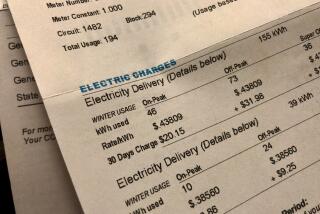In defense of the PUC
- Share via
Re “PUC ruling aided donors,” Feb. 20
On Jan. 14, the California Public Utilities Commission cosponsored a summit designed to increase green-collar energy jobs, especially those most vulnerable in this economy. The major energy utilities are hurting for trained staff. Several utilities and community organizations contributed to the expenses of the summit.
In a leap of conjecture, this article tied the utilities’ contribution to a commission decision made two weeks later advancing energy-efficiency policies. With no documentation backing up this link, the article implied a bridge across the gulf separating these two events.
The changes to the policies in question, proposed in November, sought to refine the energy-efficiency shareholder incentive mechanism adopted in September. The mechanism represents innovative PUC energy policies stretching back years that have made California a model in energy efficiency. The commissioners voted unanimously for the changes, which will motivate the utilities to pursue energy efficiency as aggressively as they might pursue building a power plant. Your article relies on innuendo of the worst kind.
Paul Clanon
Executive Director
California Public
Utilities Commission
San Francisco
This article criticizing PUC Commissioner Timothy Simon in particular, and regulators generally, for urging the corporations they regulate to assist the underserved is not universally supported by consumer groups. The Greenlining Institute and its 39 African American, Latino and Asian American members believe that commissioners should use their office to encourage those they regulate to do more for our state’s minorities. Most utilities fail to reflect the state’s diversity. Efforts by PUC commissioners or other regulators to encourage utilities to be more inclusive ought to be commended.
Robert Gnaizda
General Counsel
The Greenlining Institute
Berkeley
More to Read
Get the L.A. Times Politics newsletter
Deeply reported insights into legislation, politics and policy from Sacramento, Washington and beyond. In your inbox twice per week.
You may occasionally receive promotional content from the Los Angeles Times.










